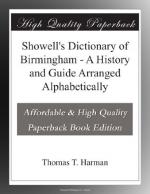name of D’Eyncourt) brought in his Bill, but
notwithstanding all that could be said or done by the
friends of the town they were outvoted (March 21,
1828), and the Bill was thrown out. The next
four years were full of trouble, and the news of the
passing of the Reform Bill (June 7, 1832), which at
last gave Birmingham its long-sought political rights
was most welcome indeed. The first election day
was fixed for December 12, and for some time it was
rumoured that Mr. Richard Spooner would stand in opposition
to Messrs. Thomas Attwood and Joshua Scholefield,
the chosen representatives of the Liberals; but the
Conservative party, deeming it but right that those
who had borne the brunt of the constitutional fight
should be allowed the first honours of the local victory,
declined to oppose those gentlemen, and they were
accordingly returned without opposition. The
hustings had been erected on a plot of land opposite
the Public Offices and here the nominations took place
at the early hour of 8 a.m. The proceedings were
over by nine o’clock, but the “victory,”
as the popular party chose to consider it, did not
satisfy them, and as there was an election on at Walsall
the same day it was determined that the Birmingham
Liberals should go there to help Mr. Bosco Attwood
in his contest with Mr. Foster. A procession
of some thousands, with bands and banners, according
marched the whole of the distance so Walsall, and if
their behaviour there represented what they were prepared
to do at home had they not been allowed to have their
own way, it was well for Birmingham they were not
opposed. Long before evening this town was in
the most fearful excitement, the passengers and guards
of the various coaches which had passed through Walsall
bringing the direst news of fire and riot, mixed with
reports of the military being called out and firing
on the people, numbers being killed, &c. Fortunately
there was much exaggeration in these tales, and by
degrees most of the Birmingham men found their way
home, though many were in sad plight through the outrageous
behaviour of themselves and the “victorious”
crew who went off so gaily with them in the morning.
The elections in after years may be briefly chronicled.
1835.—At the general election, which occurred
this year, the Town Hall was first used as the place
of nomination (Jan. 7th). During the proceedings
the front of the great gallery gave way and precipitated
those sitting there on to the heads of the people below,
but providentially, the injuries received were not
of a serious character. Mr. R. Spooner was most
impatiently heard, and the show of hands was decidedly
against him. The state of the poll showed:—
Thomas Attwood 1,718 votes }
Joshua Scholefidd 1,660 " } Returned.
Richard Spooner 915 "
1837, August.—At this election the late
sitting members were opposed by Mr. A. G. Stapleton,
but unsuccessfully, the voting being
Thomas Attwood .. 2,145 }
Joshua Scholefield .. 2,114 }Returned.
A.G. Stapleton .. 1,046




